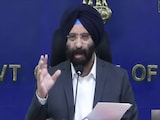The president is in a push to end what he calls "unnecessary incarceration" in a country where overpopulated prisons house 2.2 million people.
Washington:
President Barack Obama called Thursday for alternatives to incarceration for minor crimes, as he met top police officials who are calling for reforms to address chronic prison overpopulation.
"Incarceration is just one tool" in the fight against crime, Obama said at a White House meeting, measuring his words carefully to not appear soft on crime.
The president is in a push to end what he calls "unnecessary incarceration" in a country where overpopulated prisons house 2.2 million people.
"If that's the only tool, if we think we only have a hammer, then everything becomes a nail, then we are missing opportunities for us to create safer communities through drug diversion and treatments, for example, or through more effective re-entry programs," he said.
Obama met legal experts and members of a new group that includes 130 top police chiefs, sheriffs, prosecutors and attorneys general from across the country.
The group, which calls itself "Law Enforcement Leaders to Reduce Crime and Incarceration," includes the chiefs of the Los Angeles, New York City and Washington police departments.
For years, US politicians believed that the longer the prison term, the less crime there would be. This led to the adoption in the 1980s and 1990s of tough mandatory minimum sentences that are now widely criticized.
Obama has blamed both Democrats and Republicans for the problem, saying that politicians wanted to look tough on crime, especially on drug use, while ignoring alternatives.
Life on the margins
A study published last year focusing on 30 US states showed that three-quarters of prisoners released from jail were arrested again within five years.
"The same people we release from prison are the same people we return to prison, so they do spend their life banished from the tribe," said Dean Esserman, the police chief of New Haven, Connecticut.
"We put people in prison for a very long time, we put them in prison for much longer than we did years ago, we put them in prison for much longer than countries like France, England or Italy put them in prison for the identical offense for the identical person.
"I am not sure we're getting better results."
Since 1980, the US prison population has exploded by 800 percent. Cells are overflowing with drug addicts, non-violent offenders or individuals suffering from psychiatric illnesses for whom a long stint behind bars often wipes out their chance for reintegration into society.
"We do regard drug dealing as a violent crime, but no one wants to see addiction being warehoused in our jails and prisons. That needs to be treated in treatment courts and through alternatives other than incarceration," Benjamin David, a North Carolina district attorney, told AFP.
Releases coming
In a sign of change, starting in early November, the United States will release several thousand prisoners considered at low risk of becoming repeat offenders.
Beneficiaries will include inmates convicted of minor drug offenses, some of whom have been incarcerated for more than 20 years. Over time, more than 46,000 prisoners could see their sentences reduced.
But that will make only a small dent in a costly prison system that encompasses a quarter of the world's prisoners.
"If you release everyone in prison today in America, except for rapists and murderers, we would still have a higher rate of incarceration than in Germany," David said.
Retired New Orleans police chief Ronal Serpas said people were spending "incredibly long times" on relatively low level crimes because of mandatory minimum sentencing, "and we have not stopped and collectively looked back at that until just within the last year or two."
"We may have been big advocates of mass arrests 20 years ago but we've learned, we've gotten smarter," he told AFP.
"Incarceration is just one tool" in the fight against crime, Obama said at a White House meeting, measuring his words carefully to not appear soft on crime.
The president is in a push to end what he calls "unnecessary incarceration" in a country where overpopulated prisons house 2.2 million people.
"If that's the only tool, if we think we only have a hammer, then everything becomes a nail, then we are missing opportunities for us to create safer communities through drug diversion and treatments, for example, or through more effective re-entry programs," he said.
Obama met legal experts and members of a new group that includes 130 top police chiefs, sheriffs, prosecutors and attorneys general from across the country.
The group, which calls itself "Law Enforcement Leaders to Reduce Crime and Incarceration," includes the chiefs of the Los Angeles, New York City and Washington police departments.
For years, US politicians believed that the longer the prison term, the less crime there would be. This led to the adoption in the 1980s and 1990s of tough mandatory minimum sentences that are now widely criticized.
Obama has blamed both Democrats and Republicans for the problem, saying that politicians wanted to look tough on crime, especially on drug use, while ignoring alternatives.
Life on the margins
A study published last year focusing on 30 US states showed that three-quarters of prisoners released from jail were arrested again within five years.
"The same people we release from prison are the same people we return to prison, so they do spend their life banished from the tribe," said Dean Esserman, the police chief of New Haven, Connecticut.
"We put people in prison for a very long time, we put them in prison for much longer than we did years ago, we put them in prison for much longer than countries like France, England or Italy put them in prison for the identical offense for the identical person.
"I am not sure we're getting better results."
Since 1980, the US prison population has exploded by 800 percent. Cells are overflowing with drug addicts, non-violent offenders or individuals suffering from psychiatric illnesses for whom a long stint behind bars often wipes out their chance for reintegration into society.
"We do regard drug dealing as a violent crime, but no one wants to see addiction being warehoused in our jails and prisons. That needs to be treated in treatment courts and through alternatives other than incarceration," Benjamin David, a North Carolina district attorney, told AFP.
Releases coming
In a sign of change, starting in early November, the United States will release several thousand prisoners considered at low risk of becoming repeat offenders.
Beneficiaries will include inmates convicted of minor drug offenses, some of whom have been incarcerated for more than 20 years. Over time, more than 46,000 prisoners could see their sentences reduced.
But that will make only a small dent in a costly prison system that encompasses a quarter of the world's prisoners.
"If you release everyone in prison today in America, except for rapists and murderers, we would still have a higher rate of incarceration than in Germany," David said.
Retired New Orleans police chief Ronal Serpas said people were spending "incredibly long times" on relatively low level crimes because of mandatory minimum sentencing, "and we have not stopped and collectively looked back at that until just within the last year or two."
"We may have been big advocates of mass arrests 20 years ago but we've learned, we've gotten smarter," he told AFP.














